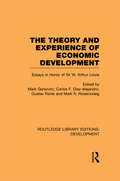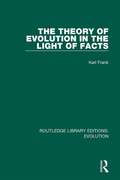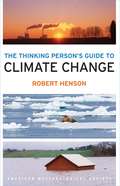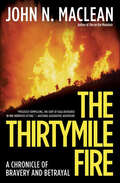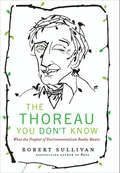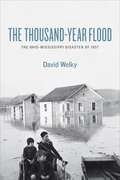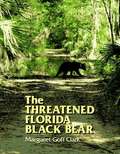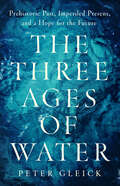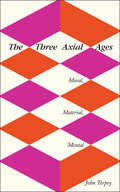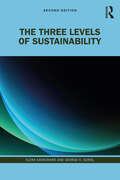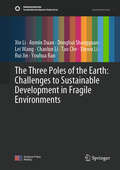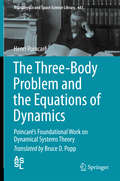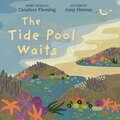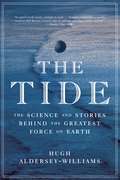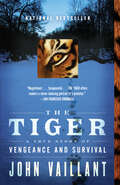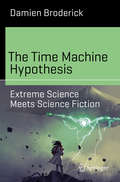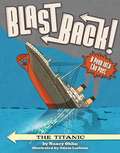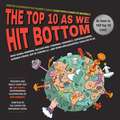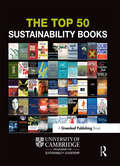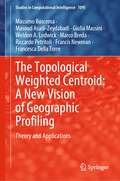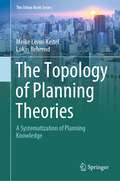- Table View
- List View
The Theory and Experience of Economic Development: Essays in Honour of Sir Arthur Lewis (Routledge Library Editions: Development #34)
by Mark Gersovitz Gustav Ranis Mark R. Rosenzweig Carlos F. Diaz-AlejandroThis volume, first published in 1982, is a collection of original essays written to honour Professor W. Arthur Lewis, 1979 co-winner of the Nobel Prize in economics. The authors, an international group of distinguished scholars, address a varied set of specific issues reflecting Professor Lewis’ research interests, covering topics which include: technological change in agriculture, analyses of unemployment and income distribution, the role of government policy in the development process, the historical record of development, and the relationship between developed and developing nations. The book will be of interest to both the academic researcher and practicing professionals in the international organisations and national governments, and are particularly appropriate to graduate courses in economic development, cost-benefit analysis and economic history.
The Theory of Evolution in the Light of Facts (Routledge Library Editions: Evolution #3)
by Charles T. DrueryOriginally published in 1913, The Theory of Evolution in the Light of Facts examines the theory of Descent; the book is a time capsule of information, providing a record of the explorations into Darwinian theory during the first half of the 20th century. The book examines the contradictions which arose between technical work of the period and the assumptions surrounding the theory of evolution. The book aims to address that which is considered ‘certain’ or ‘probable’ from postulation in order to explain and clearly define the theory of evolution. It does this through hypothesising on the development of animals and plants using the systems of Darwin and Lamarck. This book will be of interest to anthropologists and historians of natural science alike.
The Thinking Person's Guide to Climate Change
by Robert HensonEverybody can be a thinking person when it comes to climate change, and this book is a perfect roadmap. Start a web search for "climate change" and the first three suggestions are "facts," "news," and "hoax. " The Thinking Person's Guide to Climate Change is rooted in the first, up to date on the second, and anything but the last. Produced by one of the most venerable atmospheric science organizations, it is a must-read for anyone looking for the full story on climate change. Using global research and written with nonscientists in mind, the Guide breaks down the issues into straightforward categories: "Symptoms" covers signs such as melting ice and extreme weather, while "Science" lays out what we know and how we figured it out. "Debates" tackles the controversy and politics, while "Solutions" and "Actions" discuss what we can do as individuals and communities to create the best possible future. Full-color illustrations offer explanations of everything from how the greenhouse effect traps heat to which activities in everyday life emit the most carbon. Special-feature boxes zoom in on locations across the globe already experiencing the effects of a shifting climate. The Thinking Person's Guide to Climate Change combines years of data with recent research, including conclusions from the Fifth Assessment Report of the Intergovernmental Panel on Climate Change. This reference provides the most comprehensive, yet accessible, overview of where climate science stands today, acknowledging controversies but standing strong in its stance that the climate is changing-- and something needs to be done. The Thinking Person's Guide to Climate Change is a full update and revision of Robert Henson's The Rough Guide to Climate Change and is now published through the American Meteorological Society, with distribution through University of Chicago Press.
The Third Chimpanzee: The Evolution and Future of the Human Animal
by Jared DiamondPhysiologist Diamond traces humankind's biological and social development from about 40,000 years ago, to the present, and into the future. For general readers. (c) by Book News, Inc., Portland, OR.
The Thirtymile Fire: A Chronicle of Bravery and Betrayal
by John N. MacleanA riveting account of the deadly Thirtymile fire and the controversy and recriminations that raged in its aftermath, from our premier chronicler of wildfires and those who fight themThe Thirtymile fire in the remote North Cascade range near the Canadian border in Washington began as a simple mop-up operation. In a few hours, a series of catastrophic errors led to the entrapment and deaths of four members of the fire crew—two teen-age girls and two young men. Each had brought order and meaning to their lives by joining the fire world. Then the very flames they pursued turned on them, extinguishing their lives. When the victims were blamed for their own deaths, the charge brought a storm of controversy that undermined the firefighting community.Continuing a tradition established in his previous books, and by his father Norman's Young Men and Fire, John N. Maclean serves as an unflinching guide to the rogue fire's unexpected violence—which is almost matched by the passions released by the official verdict of the blaze. Weaving together the astonishing stories told by the witnesses, the victims' family members, and the official reports, Maclean produces a dramatic narrative of a catastrophe that has changed the way fire is fought. More than anything, it is a story of humanity at risk when wildfire, ancient and unpredictable, breaks loose
The Thoreau You Don't Know: What the Prophet of Environmentalism Really Meant
by Robert "Sully" SullivanRobert Sullivan, the New York Times bestselling author of Rats and Cross Country, delivers a revolutionary reconsideration of Henry David Thoreau for modern readers of the seminal transcendentalist. Dispelling common notions of Thoreau as a lonely eccentric cloistered at Walden Pond, Sullivan (whom the New York Times Book Review calls “an urban Thoreau”) paints a dynamic picture of Thoreau as the naturalist who founded our American ideal of “the Great Outdoors;” the rugged individual who honed friendships with Ralph Waldo Emerson and other writers; and the political activist who inspired Martin Luther King, Jr., Mahatma Gandhi, and other influential leaders of progressive change. You know Thoreau is one of America’s legendary writers…but the Thoreau you don’t know may be one of America’s greatest heroes.
The Thousand-Year Flood
by David WelkyIn the early days of 1937, the Ohio River, swollen by heavy winter rains, began rising. And rising. And rising. By the time the waters crested, the Ohio and Mississippi had climbed to record heights. Nearly four hundred people had died, while a million more had run from their homes. The deluge caused more than half a billion dollars of damage at a time when the Great Depression still battered the nation. Timed to coincide with the flood's seventy-fifth anniversary, The Thousand-Year Flood is the first comprehensive history of one of the most destructive disasters in American history. David Welky first shows how decades of settlement put Ohio valley farms and towns at risk and how politicians and planners repeatedly ignored the dangers. Then he tells the gripping story of the river's inexorable rise: residents fled to refugee camps and higher ground, towns imposed martial law, prisoners rioted, Red Cross nurses endured terrifying conditions, and FDR dispatched thousands of relief workers. In a landscape fraught with dangers--from unmoored gas tanks that became floating bombs to powerful currents of filthy floodwaters that swept away whole towns--people hastily raised sandbag barricades, piled into overloaded rowboats, and marveled at water that stretched as far as the eye could see. In the flood's aftermath, Welky explains, New Deal reformers, utopian dreamers, and hard-pressed locals restructured not only the flood-stricken valleys, but also the nation's relationship with its waterways, changes that continue to affect life along the rivers to this day. A striking narrative of danger and adventure--and the mix of heroism and generosity, greed and pettiness that always accompany disaster--The Thousand-Year Flood breathes new life into a fascinating yet little-remembered American story.
The Threatened Florida Black Bear
by Margaret Goff ClarkAbout Florida's endangered species of black bear.
The Three Ages of Water: Prehistoric Past, Imperiled Present, and a Hope for the Future
by Peter GleickA revelatory account of how water has shaped the course of human life and history, and a positive vision of what the future can hold—if we act now From the very creation of the planet billions of years ago to the present day, water has always been central to existence on Earth. And since long before the legendary Great Flood, it has been a defining force in the story of humanity. In The Three Ages of Water, Peter Gleick guides us through the long, fraught history of our relationship to this precious resource. Water has shaped civilizations and empires, and driven centuries of advances in science and technology—from agriculture to aqueducts, steam power to space exploration—and progress in health and medicine. But the achievements that have propelled humanity forward also brought consequences, including unsustainable water use, ecological destruction, and global climate change, that now threaten to send us into a new dark age. We must change our ways, and quickly, to usher in a new age of water for the benefit of everyone. Drawing from the lessons of our past, Gleick charts a visionary path toward a sustainable future for water and the planet.
The Three Axial Ages: Moral, Material, Mental
by John TorpeyHow should we think about the “shape” of human history since the birth of cities, and where are we headed? Sociologist and historian John Torpey proposes that the “Axial Age” of the first millennium BCE, when some of the world’s major religious and intellectual developments first emerged, was only one of three such decisive periods that can be used to directly affect present social problems, from economic inequality to ecological destruction. Torpey’s argument advances the idea that there are in fact three “Axial Ages,” instead of one original Axial Age and several subsequent, smaller developments. Each of the three ages contributed decisively to how humanity lives, and the difficulties it faces. The earliest, or original, Axial Age was a moral one; the second was material, and revolved around the creation and use of physical objects; and the third is chiefly mental, and focused on the technological. While there are profound risks and challenges, Torpey shows how a worldview that combines the strengths of all three ages has the potential to usher in a period of exceptional human freedom and possibility.
The Three Levels of Sustainability
by Elena Cavagnaro George H. CurielUnderstanding the complexity of sustainability is crucial for the leadership of business organizations, national governments, and non-governmental organizations. This second edition of the bestselling book The Three Levels of Sustainability uses the same interdependent three-level and three-dimensional framework as the first edition, encompassing societal, organizational, and individual levels, to clearly demonstrate what sustainability means and how to implement it. This new edition incorporates important developments in reporting and measuring, corporate behaviors, the impact of COVID-19, and the UN Sustainable Development Goals. More and more societies are becoming aware of their dependence on earth’s resources. However, there is still a deep-rooted lack of awareness of the connection between society’s ambitions for economic growth, earth’s limitations, and unequal distribution of wealth. Prominent institutions and organizations and their leaders rely on the conformable belief that "more quantity" equals "more quality" and that "more growth" equals "more development". Although some progress has been made since the publication of the first edition, the world is increasingly characterized by division, rising dissatisfaction, and growing inequality between countries, communities, and people. At the same time, it is anticipated that global warming will reach a point of no return between 2030 and 2052. The fundamental paradigm shift in the way the development process must be navigated is better served by a holistic and inclusive, multilevel and multidimensional approach meant to gradually align the critical institutional and individual factors essential to the pathway toward sustainable development. The book has been established as an excellent primer to explain the complex issues around sustainability for postgraduate and undergraduate students, as well as busy professionals and those already in management and leadership positions in the private, public, or non-profit sectors.
The Three Poles of the Earth: Challenges to Sustainable Development in Fragile Environments (Sustainable Development Goals Series)
by Xin Li Lei Wang Anmin Duan Donghui Shangguan Chaolun Li Tao Che Xinwu Li Rui Jin Youhua RanThe book summarizes the latest research achievements of the "CAS Earth Poles: Big Data for the Three Poles" project in actively responding to the United Nations' sustainable development goals (SDGs). The book covers six aspects: projections of future climate change in polar regions, assessment and response to climate-related cryospheric disasters, land water resource and terrestrial ecological environments in polar regions, marine environmental changes, the SDG big data platform, and big data products that support sustainable development. The book emphasizes the critical role of Earth's three poles in achieving global sustainable development, and identifies current shortcomings, and outlines major challenges. However, the book provides a comprehensive review of scientific actions and the latest research progress toward achieving SDGs at Earth’s three poles. Furthermore, the book introduces the three-pole big data platform and data products that support calculations and assessments for polar SDGs. Finally, the book offers recommendations for revising SDGs and indicators specific to the three-pole regions, and discusses pathways to achieve sustainable development in these regions. Ultimately, the book aims to address the gaps between polar sustainable development and the United Nations' SDGs, ensuring that the sustainable development of the Earth’s three poles keeps pace with global efforts.
The Three R's of Folding Time Grand Canyon Style
by Leigh AndersonHave you ever visited the Grand Canyon? As one of the world’s seven wonders, millions of people have visited this landmark. Have you ever wondered how it was formed? Learn how the 3 "R"s- Rock, Rivers, & Erosion, have led to the formation of the Grand Canyon and the changes it undergoes in present day. Discover whether how the canyon will continue to grow and change in the future. This lesson in geology gives insight to the phenomena that has created one of the Earth's greatest landmarks.
The Three Sustainabilities: Energy, Economy, Time
by Allan StoeklBringing the word sustainability back from the brink of cliché—to a substantive, truly sustainable future Is sustainability a hopelessly vague word, with meager purpose aside from a feel-good appeal to the consumer? In The Three Sustainabilities, Allan Stoekl seeks to (re)valorize the word, for a simple reason: it is useful. Sustainability designates objects in time, their birth or genesis, their consistency, their survival, their demise. And it raises the question, as no other word does, of the role of humans in the survival of a world that is quickly disappearing—and perhaps in the genesis of another world. Stoekl considers a range of possibilities for the word, touching upon questions of object ontology, psychoanalysis, urban critique, technocracy, and religion. He argues that there are three varieties of sustainability, seen from philosophical, cultural, and economic perspectives. One involves the self-sustaining world &“without us&”; another, the world under our control, which can run the political spectrum from corporatism to Marxism to the Green New Deal; and a third that carries a social and communitarian charge, an energy of the &“universe&” affirmed through, among other things, meditation and gifting. Each of these carves out a different space in the relations between objects, humans, and their survival and degradation. Each is necessary, unavoidable, and intimately bound with, and infinitely distant from, the others.Along the way, Stoekl cites a wide range of authors, from philosophers to social thinkers, literary theorists to criminologists, anthropologists to novelists. This beautifully written, compelling, and nuanced book is a must for anyone interested in questions of ecology, energy, the environmental humanities, contemporary theories of the object, postmodern and posthuman aesthetics, or religion and the sacred in relation to community.
The Three-Body Problem and the Equations of Dynamics
by Henri Poincaré Bruce D PoppHere is an accurate and readable translation of a seminal article by Henri Poincaré that is a classic in the study of dynamical systems popularly called chaos theory. In an effort to understand the stability of orbits in the solar system, Poincaré applied a Hamiltonian formulation to the equations of planetary motion and studied these differential equations in the limited case of three bodies to arrive at properties of the equations’ solutions, such as orbital resonances and horseshoe orbits. Poincaré wrote for professional mathematicians and astronomers interested in celestial mechanics and differential equations. Contemporary historians of math or science and researchers in dynamical systems and planetary motion with an interest in the origin or history of their field will find his work fascinating.
The Tide Pool Waits
by Candace FlemingDive into the rich ecology of tide pools and watch a hidden world spring in this masterful nonfiction picture book for very young readers. <P><P> Twice a day when the tide goes out, an astonishing world is revealed in the tide pools that form along the Pacific Coast. <P><P> Some of the creatures that live here look like stone. Others look like plants. Some move so slowly it’s hard to tell if they’re moving at all, while others are so fast you’re not sure you really saw them. The biggest animals in the pool are smaller than your hand, while the smallest can’t be seen at all without a microscope. <P><P> During low tide, all these creatures – big, small, fast, slow – are exposed to air and the sun’s drying heat. And so they have developed ways to survive the wait until the ocean’s return. <P><P> Candace Fleming is the author of Honeybee, which received an Orbis Pictus Honor and 7 starred reviews. She brings her knack for making science and nature appealing to the very young in The Tidepool Waits with detailed accounts of dozens of species of sea life, culminating in a perfect primer for students and nature lovers taking their first trip to the shore. Her text is accompanied by effervescent artwork by Amy Hevron and substantial backmatter. <P><P><i>Advisory: Bookshare has learned that this book offers only partial accessibility. We have kept it in the collection because it is useful for some of our members. Benetech is actively working on projects to improve accessibility issues such as these.</i>
The Tide: The Science and Stories Behind the Greatest Force on Earth
by Hugh Aldersey-WilliamsA rich and sweeping exploration into the science and history behind the most mysterious, primal, and powerful force on earth: the tide. Half of the world’s population today lives in coastal regions lapped by tidal waters. But the tide rises and falls according to rules that are a mystery to almost all of us. In The Tide, celebrated science writer Hugh Aldersey-Williams weaves together centuries of scientific thinking with the literature and folklore the tide has inspired to explain the power and workings of this most remarkable force. Here is the epic story of the long search to understand the tide: from Aristotle, who is said to have drowned himself in his efforts to figure out the Greek tides, to the pioneering investigations into the role of the moon by Galileo and Newton, to the quest to understand and even control the tide in our own time. Throughout, Aldersey-Williams whisks the reader along on his travels in search of the most remarkable tidal phenomena. He visits the Bay of Fundy in Nova Scotia, where the tides are the strongest in the world; arctic Norway, home of the raging tidal whirlpool known as the maelstrom; and Venice, to investigate efforts to defend the city against flooding caused by the famed acqua alta. Along the way, Aldersey-Williams delves into classic literary portrayals of the tide from Shakespeare to Dickens, Melville to Jules Verne. And he reveals the tidal truths behind the Homeric tale of Scylla and Charybdis, the biblical story of Moses parting the Red Sea, the conquests of Julius Caesar, the Boston Tea Party, and the D-Day landings in Normandy.
The Tiger: A True Story of Vengeance and Survival (Vintage Departures Ser.)
by John VaillantNATIONAL BESTSELLER • A gripping story of man pitted against nature&’s most fearsome and efficient predator. This "travelogue about tiger poaching in Russia&’s far east opens up a new genre ... [the] conservation thriller" (Nature).Outside a remote village in Russia&’s Far East a man-eating tiger is on the prowl. The tiger isn&’t just killing people, it&’s murdering them, almost as if it has a vendetta. A team of trackers is dispatched to hunt down the tiger before it strikes again. They know the creature is cunning, injured, and starving, making it even more dangerous. As John Vaillant re-creates these extraordinary events, he gives us an unforgettable and masterful work of narrative nonfiction that combines a riveting portrait of a stark and mysterious region of the world and its people, with the natural history of nature&’s most deadly predator.
The Time Machine Hypothesis: Extreme Science Meets Science Fiction (Science and Fiction)
by Damien BroderickEvery age has characteristic inventions that change the world. In the 19th century it was the steam engine and the train. For the 20th, electric and gasoline power, aircraft, nuclear weapons, even ventures into space. Today, the planet is awash with electronic business, chatter and virtual-reality entertainment so brilliant that the division between real and simulated is hard to discern. But one new idea from the 19th century has failed, so far, to enter reality—time travel, using machines to turn the time dimension into a two-way highway. Will it come true, as foreseen in science fiction? Might we expect visits to and from the future, sooner than from space? That is the Time Machine Hypothesis, examined here by futurist Damien Broderick, an award-winning writer and theorist of the genre of the future. Broderick homes in on the topic through the lens of science as well as fiction, exploring some fifty different time-travel scenarios and conundrums found in the science fiction literature and film.
The Titanic (Blast Back!)
by Adam Larkum Nancy OhlinYou may have heard of the movie Titanic, but what was life on the actual Titanic really like? This engaging nonfiction book, complete with black and white interior illustrations, will make readers feel like they've traveled back in time. It covers everything from how the ship was built to what the passengers did for fun, and more. Find out interesting, little-known facts such as how the anchor was so heavy that they needed to use twenty horses to lift it and how the ship's musicians continued to play as the ship sank. The unique details, along with the clever illustrations, make this series stand out from the competition.
The Top 10 As We Hit Bottom: What Global Warming, Nuclear War, Cyberwar, Pandemics, Supervolcanoes, Asteroid Strikes, Out-of-Control A.I., and Other Unpleasantries Could Do to Us.
by Jim ParryFrom best-selling author and illustrator Ron Barrett, who forecasted the weather in the classic picture book, Cloudy With a Chance of Meatballs, now predicts how—thanks to climate change and other unpleasantries—the world will end! With research and really scary text by Jim Parry, The Top Ten As We Hit Bottom is a darkly humorous collection of &“Top Ten&” lists that highlights the predicament global warming and other impending catastrophes have put us into. Though some might call these lists &“fake news&” (we&’re looking at you, Donald), these lists are compiled and culled from the world's most credible authorities like NASA, the UN, and the Union of Concerned Scientists. But coupled with darkly humorous illustrations, you&’ll be laughing your way all the way down in our race toward the bottom! Here are some Top 10 lists to whet your appetite for Earth&’s impending doom: &“Top 10 species we&’ll lose to climate change&”&“Top 10 avalanches mostly caused by global warming&”&“Top 10 climate change deniers&”&“Top 10 times we almost had a nuclear war,&”&“Top 10 things that will happen when the Yellowstone Supervolcano erupts,&”&“Top 10 ways to try to stop an asteroid,&”&“Top 10 signs that the earth is about to be swallowed by a black hole,&”&“Top 10 ways a particle accelerator mishap could destroy the world,&”&“Top 10 end-of-world cults you can join now.&”And many more!
The Top 50 Sustainability Books
by Wayne VisserThis unique title draws together in one volume some of the best thinking to date on the pressing social and environmental challenges we face as a society. These are the Top 50 Sustainability Books as voted for by the University of Cambridge Programme for Sustainability Leadership's alumni network of over 3,000 senior leaders from around the world. In addition to profiles of all 50 titles, many of the authors share their most recent reflections on the state of the world and the ongoing attempts by business, government and civil society to create a more sustainable future. Many of these authors have become household names in the environmental, social and economic justice movements – from Rachel Carson, Ralph Nader and E.F. Schumacher to Vandana Shiva, Muhammad Yunus and Al Gore. Others, such as Aldo Leopold, Thomas Berry and Manfred Max-Neef, are relatively undiscovered gems, whose work should be much more widely known. By featuring these and other seminal thinkers, The Top 50 Sustainability Books distils a remarkable collective intelligence – one that provides devastating evidence of the problems we face as a global society, yet also inspiring examples of innovative solutions; it explores our deepest fears and our highest hopes for the future. It is a must-read for anyone who wants to tap into the wisdom of our age.
The Topological Weighted Centroid: Theory and Applications (Studies in Computational Intelligence #1095)
by Massimo Buscema Weldon A. Lodwick Giulia Massini Marco Breda Francis Newman Masoud Asadi-Zeydabadi Riccardo Petritoli Francesca Della TorreThis book introduces the Topological Weighed Centroid approach and describes some applications in the study of the dynamics of various spatial phenomena with a special emphasis on the spatial analysis of the relationship, influence, and dynamics of geographical phenomena. Offering a comprehensive introduction to the theory and illustrative examples from various kinds of geographical data, this book also takes an in-depth look at more complex case studies, such as the applications of the topological weighed centroid approach in the study of epidemic patterns, cultural processes, criminality, and environmental phenomena.
The Topology of Planning Theories: A Systematization of Planning Knowledge (The Urban Book Series)
by Meike Levin-Keitel Lukas BehrendThe book discusses and organizes planning theories in a new way. Building on a foundation in scientific theory, both planning practice and the planning sciences are thereby classified and their inherent importance is organized in terms of knowledge generation. The core of the book is a knowledge-oriented systematization of planning knowledge in the form of planning theories, the topology of planning theories. The target audience of this work are academic as well as practical users from diverse disciplines with spatial impact, such as spatial planning, urban planning, regional planning, landscape planning, geography, urban studies, architecture and landscape architecture.
The Tornado Scientist: Seeing Inside Severe Storms (Scientists in the Field Series)
by Mary Kay CarsonIn this addition to the critically-acclaimed Scientist in the Field series, scientist Robin Tanamachi and her team are trying to save countless lives across America’s heartland, chasing one tornado at a time. Robin Tanamachi has been captivated by tornadoes and extreme weather her entire life. When she realized people researched weather for a job, she was hooked. She now studies tornadogenesis, or how tornadoes form, and what causes them to get weaker versus strengthen. For her, driving around in a Doppler radar truck aiming towards storms is a normal day in the office. The data she collects is then modeled and studied on computers—with math, physics, and computer science working hand in hand with meteorology. At the end of the day, knowing exactly how, when, and where these violent storms happen can give more warning time for everyone involved.
